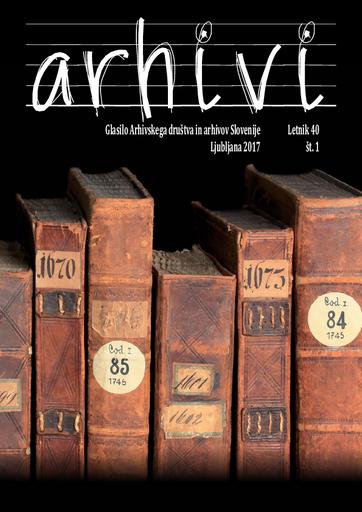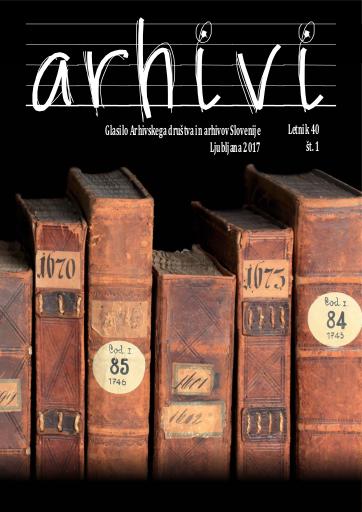/
Serijske publikacije
/
Arhivi
Nekdanji diplomat Bogumil Vošnjak v času druge svetovne vojne in emigracije ter njegova prizadevnost za tržaško vprašanje


To delo avtorja Aleksandra Gačić je ponujeno pod Creative Commons Priznanje avtorstva-Nekomercialno-Deljenje pod enakimi pogoji 4.0 Mednarodna
Datoteke (1)

Opis
V članku so predstavljeni Vošnjakovo življenje in delovanje med drugo svetovno vojno ter njegovo prizadevanje po pobegu v ZDA za obnovitev Jugoslavije, kakršna je obstajala pred vojno. Prikazano je njegovo delovanje v Narodnem odboru za Slovenijo ter v ameriških institucijah in organizacijah. Poudarek je na njegovem izrednem zanimanju za tržaško vprašanje. Članek zajema tudi Vošnjakove poskuse pri povezovanju različnih frakcij med jugoslovanskimi emigranti. Raziskave temeljijo zlasti na gradivu Arhiva Republike Slovenije in arhiva Studia Slovenica, pri čemer gre za bogat vir njegovega še neobjavljenega dnevnika.
Metapodatki (12)
- identifikatorhttps://hdl.handle.net/11686/41469
- naslov
- Nekdanji diplomat Bogumil Vošnjak v času druge svetovne vojne in emigracije ter njegova prizadevnost za tržaško vprašanje
- Former Diplomat Bogumil Vošnjak at the Time of the World War II, Emigration and the Issue of Trieste
- ustvarjalec
- Aleksandra Gačić
- soavtor
- Gregor Jenuš (gl. in odg. ur.)
- Dunja Mušič (teh. ur.)
- Petra Markuš (lekt.)
- Petra Markuš (prev.)
- Nina Gostenčnik, Sabina Lešnik (foto.)
- predmet
- ČLANKI IN RAZPRAVE
- Bogumil Vošnjak
- druga svetovna vojna
- emigracija
- Narodni odbor za Slovenijo
- tržaško vprašanje
- svetovalec v begunskih zadevah
- ARTICLES AND PAPERS
- Bogumil Vošnjak
- World War II
- emigration
- National Committee for Slovenia
- Trieste question
- consultant in refugee matters
- opis
- A person who used to function in high political and diplomatic circles abroad and at home finds it difficult to accept the fate and the fact that he has virtually no value anymore. After the extraordinary activities in the Yugoslav Committee, appearance at Paris Peace Conference and being recalled from his position as Emissary and Minister Plenipotentiary in Prague, Vošnjak‘s value started to fade. Although he was functioning in the Constitutional Assembly and the National Assembly under the aegis of the State Department as an advisor, he did not stand out. Without his former standing, he launched himself into turbulent happenings of the Second World War and endeavored to flee his homeland, probably hoping to help it as he did in the first emigration.However, all attempts of escape failed, which led to his joining the Chetnik movement and seeking to help Slovenes in exile who had taken refuge in Serbia. After the war, he found himself in Rome where he was helped by Miha Krek, and was serving on the National Committee for Slovenia. After several attempts, he successfully emigrated to the USA where he had even less value. Yet, despite the emigration and his age, Vošnjak never forgot his homeland buttried to help it as much as he was able.He sought to help primarily Slovenian refugees and those who due to disagreement with the Communist authorities tried to flee to the USA, for which they needed appropriate guarantees. These very refugees provided Vošnjak with the information on the situation in Yugoslavia as Vošnjak never set foot on the domestic territory, precisely because of the threat of his liquidation. As if he turned back time, he found himself facing the same fight as during the Great War. The role he played then was not as trifling in the USA, since he was remembered by some and therefore established direct contact with a few prominent Americans. He made effort to convince important American politicians to help Slovenians with Trieste issue, bearing in mind that he was interested in Trieste territory even in the first emigration. Then he fought to free Yugoslavs from Austria-Hungary domination and this time for their liberation from Tito‘s totalitarian regime. In the conclusion it is worth recalling the fact that Vošnjak did not have a real connection with his homeland as all information he had, he gleaned only from the opponents of the Communism in the homeland with whom he engaged in correspondence. Some information and news he obtained almost at the end of his life upon encountering people in refugee centers whom he visited following the authorisation given by the US authorities in Europe. How did Vošnjak‘s homeland respond to his efforts and if they even knew about him could not be observed from the examined sources. We can only assume that his home country did not know about him, as also indicated by long-standing silence or rather his life and work left unexplored, especially after his departure to the USA following the Second World War. Vošnjak believed until the end that he will someday return to his homeland and will, together with other emigrants, have a place among established and prominent people in Yugoslavia thus being able to help shape politics and realize he never reached his ideal – unitarist concept.
- založnik
- Arhivsko društvo Slovenije
- datum
- 2017
- 01. 01. 2017
- tip
- besedilo
- jezik
- Slovenščina
- jeDelOd
- pravice
- licenca: ccByNcSa
